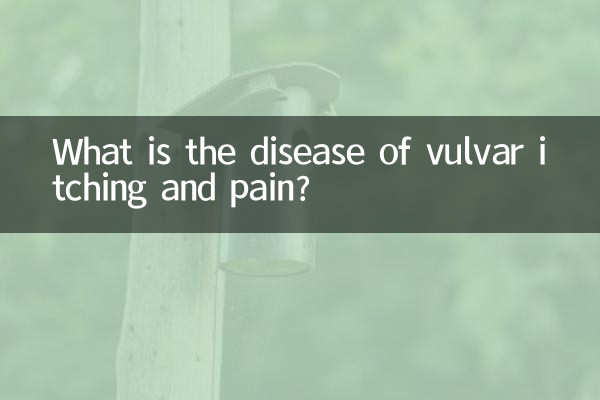What is vulvar itching and pain?
Vulvar itching and pain are a common symptom that many women may experience and can be caused by a variety of reasons. This article will combine the hot health topics on the Internet in the past 10 days to provide you with a detailed analysis of the possible causes, symptoms and coping methods of vulvar itching and pain, and provide structured data for reference.
1. Common causes of vulvar itching and pain

Vulvar itching and pain may be caused by infection, allergies, skin diseases, or systemic diseases. The following are common causes:
| Cause type | specific disease | Typical symptoms |
|---|---|---|
| Infectious diseases | Fungal vaginitis, bacterial vaginosis, trichomonas vaginitis | Itching, burning sensation, abnormal discharge |
| Allergy or irritation | Contact dermatitis, allergy to sanitary products | Redness, swelling, rash, severe itching |
| Skin diseases | Vulvar eczema, psoriasis, lichen sclerosus | Dryness, scaling, pain |
| systemic factors | Diabetes, changes in hormone levels | Recurrent itching, accompanied by other systemic symptoms |
2. Analysis of recent hot health topics
According to the health information in the past 10 days, the following topics are highly relevant to female vulva health:
| hot topics | focus | associated diseases |
|---|---|---|
| High incidence of fungal vaginitis | Wet weather leads to increased infections | fungal vaginitis |
| Controversy over private parts care products | Allergies caused by excessive cleaning or inappropriate supplies | contact dermatitis |
| Hormone replacement therapy discussion | Postmenopausal vulvar dryness problem | atrophic vaginitis |
3. How to determine the cause and countermeasures
1.Observe symptom characteristics:- If it is accompanied by tofu-like discharge, it may be a fungal infection. - If fishy-smelling discharge occurs, it may be bacterial vaginosis. - Dry and chapped skin may be due to skin diseases or hormonal effects.
2.Medical examination:- Gynecological examination, secretion testing, blood sugar testing, etc. can help confirm the diagnosis. - Consultation with dermatology or endocrinology is required if necessary.
3.Daily care suggestions:- Avoid over-cleansing and choose gentle, non-irritating care products. - Wear breathable cotton underwear to keep your vulva dry. - Eat a light diet and reduce sugar intake (especially if you have a fungal infection).
4. Recently hot-searched related treatment options
| treatment plan | Applicable diseases | Things to note |
|---|---|---|
| Antifungal drugs (such as fluconazole) | fungal vaginitis | It is necessary to take medication according to the course of treatment to avoid recurrence |
| Antibiotics (such as metronidazole) | bacterial vaginosis | Doctor's guidance is required to avoid abuse |
| Hormone ointments (such as estrogen cream) | atrophic vaginitis | Long-term use requires monitoring |
5. Prevention and life suggestions
1. Enhance immunity, maintain a regular schedule, and reduce the risk of recurrence. 2. Avoid overuse of antibiotics to prevent damaging the balance of vaginal flora. 3. If the partner has symptoms, simultaneous treatment is required (such as trichomonas infection). 4. Regular physical examinations, especially for people at high risk of diabetes.
Summary:Vulvar itching and pain may be a sign of a variety of diseases, and the cause needs to be determined based on symptoms and examination. Recent health information suggests that fungal infections and improper care are current high-risk problems. If symptoms persist or worsen, be sure to seek medical treatment promptly to avoid delays in treatment.

check the details

check the details